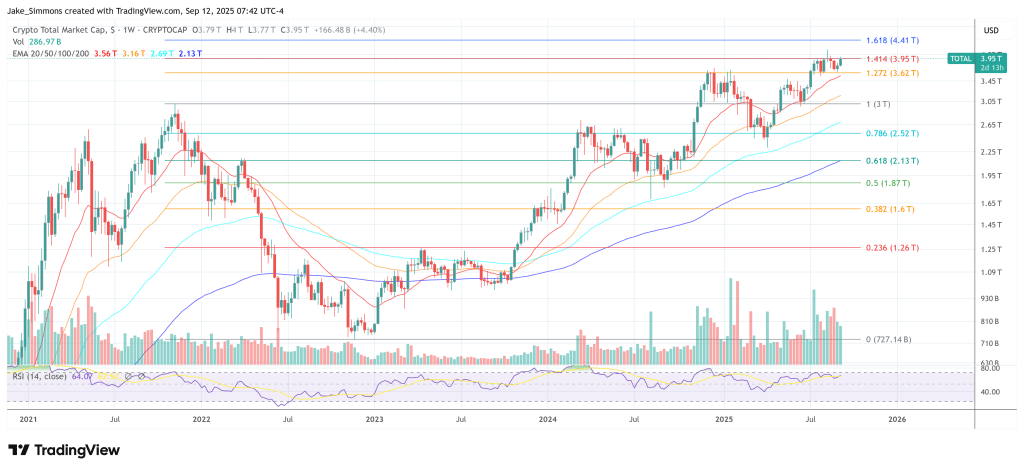It appears the US government has decided it’s time to turn the spotlight of the PATRIOT Act onto crypto, like an overzealous gamekeeper on a foggy morning, ready to slap regulations on anything that moves. According to The Rage (yes, that’s the actual name, and no, it’s not a band), the Treasury Department is dusting off Section 311 of the USA PATRIOT Act, one of the most infamous surveillance tools in the financial world, and pointing it squarely at crypto activities like mixers, DeFi protocols, and, just for good measure, wallet services.
Now, here’s where things get really thrilling. The Financial Crimes Enforcement Network (FinCEN) is in charge of this operation, drafting a rule to officially declare crypto mixing services as a “primary money laundering concern.” Yes, folks, a “primary” one! This would give the Treasury Department the power to cut these services off from the entire US financial system. Fancy that! The good old US of A could soon be putting up walls around these services faster than you can say “decentralized finance,” prohibiting banks, exchanges, and payment processors from dealing with them.
US Revives War On Crypto Privacy
The Rage’s fearless reporting suggests that this new rule would be much like the “mixer rule” FinCEN floated back in 2022 after the Tornado Cash sanctions. But, hold your horses-this time it’s got an even bigger, more thrilling bite! Section 311 allows the Treasury to blacklist not just specific entities, but whole categories of transactions deemed risky. In short, if FinCEN decides a protocol is dodgy, it could very well shut it out of the entire regulated economy. Privacy, anyone? 😬
Francis Pouliot, the CEO of Bull Bitcoin (he sounds like a chap who knows a thing or two about the crypto scene), took to X to declare: “US BUREAUCRATS ATTACK ON BITCOIN USERS PRIVACY.” He then went on to describe a potential Orwellian nightmare for Bitcoin users, which might sound dramatic, but then again, when the government is involved, who’s counting the drama? The message is clear: if we let them, they’ll treat any Bitcoin use not done in a “tracked custodial wallet” as “suspicious.” 😏
Of course, lawmakers are all too eager to join in. A group in the House has reintroduced the “Special Measures to Combat Money Laundering Act,” which would essentially codify the Treasury’s use of Section 311 for cryptocurrencies. And don’t forget, once a law is put on the books, it’s like a stampede-there’s no stopping it. We could soon see far more privacy-focused crypto tools in the crosshairs of the government. Not very decentralized, is it? 😒
Observers are warning that this new strategy could go beyond mixers. If Treasury determines that certain smart contracts or decentralized protocols are “facilitating illicit finance” (a very cozy, broad term), those platforms could also be lumped in with the blacklisted bad boys. That could lead to a real scramble for US intermediaries to block interactions with them. Talk about a walling off from the financial system! 🏰
One particularly insightful policy expert (who must have a nice comfy chair for all that wisdom) cautioned, “This is not just about Tornado Cash. Once these powers are formally extended, any DeFi protocol Treasury sees as a money-laundering vehicle could end up on the list. That’s a game-changer for the whole sector.” Ah, how nice-everyone’s getting involved! 😜
Industry reaction? Oh, it’s going to be *fierce.* Crypto advocates are already up in arms, claiming that using Section 311 in this way would stomp on innovation and trample due process by classifying open-source code as “criminal infrastructure.” Civil liberties groups are already fighting the good fight against Treasury’s previous actions, warning that these blanket bans could erase the constitutional rights of developers and users alike. Exchanges and custodians will likely face more regulatory headaches than they know what to do with. 🧐
This whole saga is unfolding against the backdrop of the US ramping up its focus on financial flows tied to sanctioned entities, cybercriminals, and other unsavory characters. Apparently, Treasury has been eyeing North Korean hackers, Russian darknet markets, and ransomware groups with a suspiciously keen eye. All of these bad actors, they say, are using crypto mixing services to hide their tracks. So, naturally, the solution is to apply the nuclear option of the PATRIOT Act to them. 🤯
Whether this proposed rule survives legal challenges remains to be seen, of course. The Tornado Cash sanctions are still in legal limbo, and expanding PATRIOT Act powers into the decentralized ecosystem will likely trigger all sorts of constitutional debates. Still, Washington has made one thing clear: the honeymoon period of relaxed crypto oversight is over. 😅
As The Rage so wonderfully concludes: “The PATRIOT Act has long been the government’s nuclear option in financial surveillance. By turning it toward crypto, the Treasury is making clear that no corner of the digital asset industry is beyond its reach.” Well, isn’t that comforting? 😏
At press time, the total crypto market cap stood at $3.95 trillion.

Read More
- God Of War: Sons Of Sparta – Interactive Map
- Overwatch is Nerfing One of Its New Heroes From Reign of Talon Season 1
- Someone Made a SNES-Like Version of Super Mario Bros. Wonder, and You Can Play it for Free
- Poppy Playtime 5: Battery Locations & Locker Code for Huggy Escape Room
- Poppy Playtime Chapter 5: Engineering Workshop Locker Keypad Code Guide
- Why Aave is Making Waves with $1B in Tokenized Assets – You Won’t Believe This!
- Meet the Tarot Club’s Mightiest: Ranking Lord Of Mysteries’ Most Powerful Beyonders
- One Piece Chapter 1175 Preview, Release Date, And What To Expect
- Bleach: Rebirth of Souls Shocks Fans With 8 Missing Icons!
- All Kamurocho Locker Keys in Yakuza Kiwami 3
2025-09-13 04:20